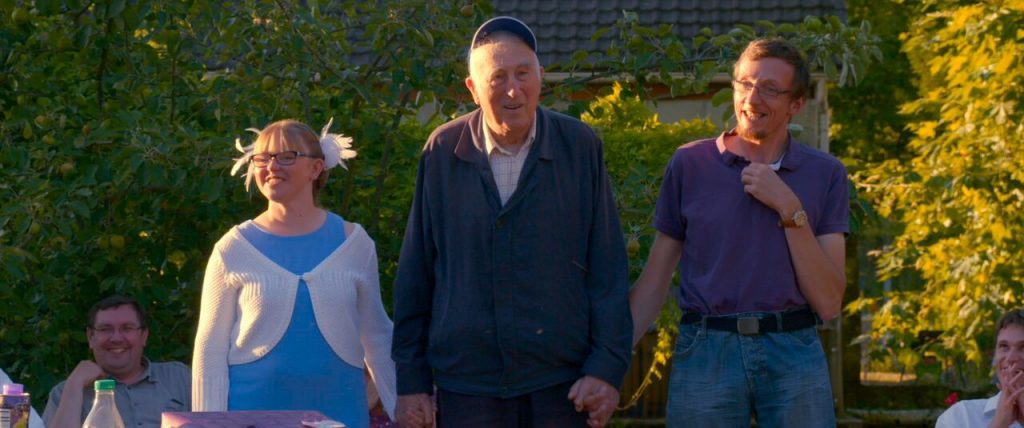Jean Vanier is the now 89-year-old founder of L’Arche (the Ark).
L’Arche is many things — a sanctuary for the developmentally disabled in which they and their assistants, as they are called, live together as members of the community.
An international federation that has spread throughout 37 countries and 149 communities. A sign. A paradox. A sticking point.
A mystery, based on Vanier’s abiding beliefs: that the disabled are not burdens but rather teachers, that our strength as human beings lies not in our worldly accomplishments, but rather in our vulnerability.
Vanier has written more than 30 books, and travels worldwide to give retreats, visit fellow houses, encourage and teach. But he makes his home at (and is still a member of) the original L’Arche community, Le Val Fleuri, in Trosly-Breuil, France.
“Summer in the Forest,” the 2018 documentary directed by Randall Wright, is so named because of the sunlight-dappled forest that lies adjacent to that community.
As we meander through, we get a taste of Vanier’s personality.
“I think we human beings have a mysterious compass that leads us to do what is right,” he observes. “It’s something about the inner voice.”
We learn a bit of how he came to found L’Arche.
In 1942, when he was 13, he decided he wanted to go to England and join the Naval College. “It was the most important moment of my life — that Dad would listen to me and accept that my desire was important.”
He discovered the “gloriousness, if I may use the word,” of war and the horror of the concentration camp. He knew nothing of the world of disability.
Then someone suggested that he visit an institution southwest of Paris. There he found chaos, screaming, profound dehumanization. He met a man who had been locked up in a cellar for years.
Elsewhere he has said, “I wanted to follow Jesus. There are some things you do without reasoning.”
During the early days of L’Arche, “There were noises all night. I lost my sleep. I was confronted by violence. There was rarely a day when there wasn’t a window broken.”
It took a long time for L’Arche to become a place of peace, where “people who had been crushed could start flowing and living and flowering,” a place of fulfillment and joy, of celebration and laughter.
Wisely, however, the film focuses not so much on Vanier, or the other assistants, but on the people who have come to live there, to unwittingly teach — on the disabled themselves.
They are of all ages, races and levels of function. We learn their names and stories, rather than their diagnoses. But mostly we just get to watch them as they shave, eat, laugh, dance, struggle, make mosaics, sleep, wake, wander.
And it is through his interactions and deep affection for them in which Vanier’s spirit is most clearly revealed.
Of Michel Petit, 75, who was institutionalized and beaten as a child: “The beauty of Michel’s fragility is that he knows he’s fragile.”
Of Patrick Druault, 65: “Patrick is a beautiful man. He’s completely crazy. And yet at the same time he’s not. … Patrick is also in some mysterious way a loner. A loner looking for cigarettes.”
Of André Stubenrauch, 66: “André is a little child — but he also wants to wrestle.”
One of the film’s most moving scenes takes place at the L’Arche community in Bethlehem.
The camera stays for a full minute with a young Palestinian woman who is trying to get a purchase on a glass teacup. She turns it this way — can’t quite get a grip. She turns it the other way — almost, but no dice.
Finally, her crippled fingers manage a firm hold and she is able, with a beatific look of pure concentration, to raise the cup torturously to her lips and take a sip. It’s a moment of quiet, hard-won triumph with which any lurching, faltering human being must be in deep solidarity.
“The disabled are not seeking power — they’re seeking friendship. They can teach us about freedom and foolishness,” says Vanier. “Because in each of us is a little child yearning for peace and for love.”
In his 1992 book “From Brokenness to Community,” he writes of Armando, an 8-year-old boy who could not walk or talk and had been abandoned in an orphanage:
“That is the power of Armando. In some mysterious way, in all his brokenness, he reveals to us our own brokenness, our difficulties in loving, our barriers and hardness of heart. If he is so broken and so hurt and yet is still such a source of life, then I too am allowed to look at my own brokenness and to trust that I too can give life to others. … I am allowed to be myself, with all my psychological and physical wounds, with all my limitations but with all my gifts too. And I can trust that I am loved just as I am, and that I too can love and grow.”
Heather King is a blogger, speaker and the author of several books. For more, visit heather-king.com.

